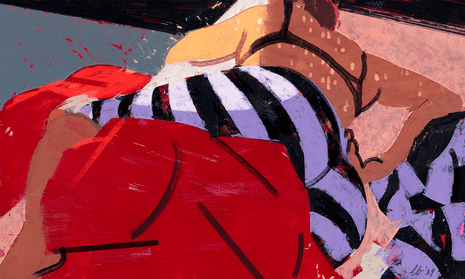In my 20s and 30s, I went hard, driven by a desire to live life fully. I wanted to stay up all night having heated conversations, collect experiences and adventures, make art and meaning from everything that happened. Somewhere in the far-off distance I pictured myself making it to age 40, but never thought further than that: I would turn 40 ... and then I’d be 65?
My naivete died three years ago in the middle of the night. I woke up drenched in perspiration, shivering. It was shocking to find myself suddenly so cold and in the dark. Within a month, I was waking at least twice a week – three, four or even five times a night.
But it wasn’t just the night sweats. My menstrual cycle changed, dropping a day for several months, then bouncing back, then shortening again. The first two days of my period became much heavier – “crime scene periods”, another middle-aged friend and I would text each other, relieved we were not alone in this mess.
In a Goodwill dressing room one afternoon, a furnace roared to life in my lower abdomen, setting my head and limbs ablaze. I stripped off the sundress I was trying on, ripping one of its seams. My first hot flash. I didn’t understand what was happening. Was it perimenopause – the dawn of the end of my fertility? And if it was, wasn’t I, at 43, too young to be having it?
Jessica Grose wrote in the New York Times that “the perimenopausal period is associated with as many as 34 different maladies ranging from hair loss to ‘burning mouth syndrome’, which is a tingling or numb feeling in your lips, gums and tongue”.
The lengthy and nebulous list of perimenopausal symptoms triggered a familiar feeling in me. When I wrote Like a Mother, a book about the outdated scientific and cultural myths of pregnancy in 2016, nearly every expert I interviewed said some variation of the same thing: compared to what we should know about this basic human process, we know nothing.
A lack of definitive information, especially when it comes to female reproductive health, does not indicate that a condition is too obtuse or mysterious to understand. Most likely it means that the condition has been dismissed, undervalued and poorly researched.
Trying to find information about menopause was confusing and disorienting. Various websites and texts gave inconsistent definitions. But I liked the approach OB-GYN Jen Gunter took in her book The Menopause Manifesto. Gunter describes the years leading up to and following the end of reproductive fertility as the “menopause continuum”, which includes the whole process from pre-menopause to post-menopause. The idea of a continuum accounted for the fact that the journey can amount to decades. Menopause can take up fully a third or even half of someone’s life.
For all the time we spend in this zone, we know frustratingly little about it. Many enter this era entirely unequipped. Roughly half of all humans will go through this, yet it’s rarely talked about openly. And each of us experiences it differently. There’s biology, but also the context of our lives: relationships, race, access to healthcare, family histories.
At 46, I’ve been experiencing what Gunter calls “menopause transition” symptoms for three years. There are the night sweats and heavy periods. I also need to pee all the time, including 10 minutes after I last peed. My vagina sometimes feels like a brittle husk.
It’s easy to focus on the inconveniences. But alongside these hormonal, nocturnal and vaginal changes, I’ve experienced a softening, an openness. In the last three years, I’ve made changes I could barely think about a decade ago. I grew out my gray hair. I started taking antidepressants. I got sober. I ask for help more often. I fight less with my mother. I feel more porous, open to others, less concerned with myself.
My first instinct, when I look at myself in the mirror, is not to judge, but to simply try to see me, clear-eyed and realistic.
after newsletter promotion
In her non-fiction book Flash Count Diary, novelist Darcey Steinke explains how she discovered that hot flashes can result in greater empathy. “The hot flash comes unbidden. You can’t control your body, and this makes women more empathetic to others who are suffering,” Pauline Maki of the Center for Research on Women and Gender at the University of Illinois at Chicago tells Steinke.
I would like to know approximately how many more years I’ll be boiling my silicone menstrual cups, or whether I should buy a bulk-size bottle of lube. I wonder if the overwhelming sadness I sometimes feel is due to hormone surges or the world’s grimness.
But I have achieved a level of peace I didn’t think possible. Often that peace comes, refreshingly, from an unwillingness to give a shit about trivial nuisances.
My former inability to picture middle age is both a failure of my own imagination and of American culture, which is hyperfocused on youth – it offers few meaningful images or discussions of female middle age. This span does involve uncertainty and loss, but the cultural conversation should also encompass the accompanying richness, expansiveness and growth. The deeper becoming.
I may not totally recognize the woman I see when I look in the mirror, but I am curious about her. I’ll follow her. I think she’s going to take me somewhere interesting.
